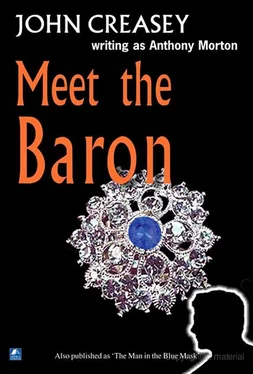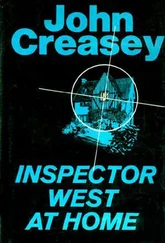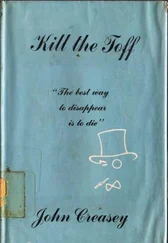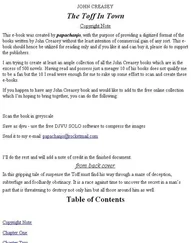John Creasey - Meet The Baron
Здесь есть возможность читать онлайн «John Creasey - Meet The Baron» весь текст электронной книги совершенно бесплатно (целиком полную версию без сокращений). В некоторых случаях можно слушать аудио, скачать через торрент в формате fb2 и присутствует краткое содержание. Жанр: Старинная литература, на русском языке. Описание произведения, (предисловие) а так же отзывы посетителей доступны на портале библиотеки ЛибКат.
- Название:Meet The Baron
- Автор:
- Жанр:
- Год:неизвестен
- ISBN:нет данных
- Рейтинг книги:5 / 5. Голосов: 1
-
Избранное:Добавить в избранное
- Отзывы:
-
Ваша оценка:
- 100
- 1
- 2
- 3
- 4
- 5
Meet The Baron: краткое содержание, описание и аннотация
Предлагаем к чтению аннотацию, описание, краткое содержание или предисловие (зависит от того, что написал сам автор книги «Meet The Baron»). Если вы не нашли необходимую информацию о книге — напишите в комментариях, мы постараемся отыскать её.
Meet The Baron — читать онлайн бесплатно полную книгу (весь текст) целиком
Ниже представлен текст книги, разбитый по страницам. Система сохранения места последней прочитанной страницы, позволяет с удобством читать онлайн бесплатно книгу «Meet The Baron», без необходимости каждый раз заново искать на чём Вы остановились. Поставьте закладку, и сможете в любой момент перейти на страницу, на которой закончили чтение.
Интервал:
Закладка:
“And these policemen,” she mourned, “they’re so helpless, Mr Mannering. That man Bristow — I’m convinced he said something under his breath when I saw him this evening.”
“It wouldn’t surprise me,” admitted Mannering, smiling, “but he’s probably doing his best. He’s after a clever rogue, and . . .”
“Clever!” snorted Lady Kenton. “Clever! A sneaking, cowardly cat-burglar who robs a poor, helpless woman! Clever! The scoundrel! If I could only find him, Mr Mannering, I’d — I’d . . .”
“Cocktail, m’lady?” said her ladyship’s footman. “Dinner in half an hour, m’lady.”
Lady Kenton lifted her glass to Mannering, and told herself that he had quite the most fascinating smile she had ever seen. What a lucky girl Lorna Fauntley was, if Loma only knew it!
Lorna moved from a small group of people gathered round the television-set in the corner of the room; her dark hair was still a little unruly, her eyes were still mutinous and still probing, although they cleared as she reached the Dowager and Mannering.
“I was just saying . . .” began the Dowager.
“I believe with a little prompting I could almost guess,” laughed Lorna. “It’ll be something to do with a burglary . . .”
Lady Kenton looked offended, John Mannering laughed, until the Dowager’s frown cleared. Lorna squeezed the older woman’s hand and accepted a cocktail.
CHAPTER SEVEN
A TALK WITH A GENTLEMAN
OTHER RUMOURS FLOATED INTO SCOTLAND YARD ABOUT THE man who called himself Baron. An expert safe-breaker whose fingers were still nimble but who was nearing the end of his career volunteered the information that a man in a tweed cap and a long mackintosh had asked for lessons in the cracksman’s art. Of course, the old lag said virtuously, he’d called at the wrong house; but Bristow doubted it. Then Red Flannagan, who preferred the modern method of cracking safes with the use of gelignite, admitted that a man in a black suit, wearing a trilby hat pulled down over his eyes, had called on him and suggested lessons. “An’ at no correspondence-school prices, neither,” said Red. “I told ‘im where to go, Bill.”
“Don’t be familiar,” snapped Bill Bristow; “and if you haven’t been working and you didn’t take his money, how is it you’re so flush lately?”
“Yer can’t prove nothin’,” snarled Red.
That tells me a lot,” said Bristow thoughtfully.
He grew a little closer to Baron when Flick Leverson was caught trying to smuggle a little packet of precious stones out of the country. All the gems were stolen property, and Bristow knew that Flick was a fence of high degree. He was elated when he discovered that the bigger stones from the Kia bracelet and the Kenton brooch were in Flick’s packet.
“It’ll go easier for you,” Bristow told the fence, “if you’ll give me a description of the man you bought those two things from — and tell me everything you know about him.”
“Then it won’t go easier for me,” said Flick philosophically. “He wore a mask, Bill, a tweed cap, a mackintosh, and rubber-soled shoes. I’ve never seen him before nor since. I don’t know where he came from.”
“What kind of mask?” asked Bristow.
“A handkerchief over his mouth and nose.”
“Colour?”
“Blue or black. It was after dark when I saw him.”
“How did he know about you ?”
“No idea,” said Leverson, and Bristow knew that the fence would not talk a great deal.
“Voice ?” he snapped.
“Up in the air,” said Flick. “Squeaky and . . .”
“Oh, damn it!” muttered Old Bill, to the fence’s surprise, for Bristow was usually a good-tempered officer.
Whether it was the same man with a different voice, or whether Baron had passed the two pieces of jewellery to someone else for disposal. Old Bill didn’t know. He did know, however, that he was beginning to worry about Baron.
Small jewel-robberies were reported to the Yard frequently from various counties, and London’s Society suffered considerably from the same trouble. If there was anything remarkable about the thefts, Bristow told himself, it was that they all took place during a dance, dinner-party, or celebration of some kind or other. When he went over them more carefully with Superintendent Lynch he discovered two other things of interest.
The robberies seemed to follow the Fauntley family round England. Lord and Lady Fauntley, Lorna, John Mannering, the Dowager Countess of Kenton, and half a dozen other members of the same set were always present. And every time the theft was of a trinket of comparatively small value. No effort was made to take more valuable stones, such as Lady Fauntley’s Liska diamond.
“Get all the dope you can,” said Lynch, “on the servants of that crowd. It’s beginning to look like an inside job, Bill.”
“But there’s always definite proof that the man came from the outside,” said Bristow.
“ Too definite,” said Lynch. Then, cautiously: “At least, it might be.”
Bristow put half a dozen men on to the task of following the history of the various servants, but little came of the investigation. There wasn’t a bad record — nor even a suspicious one — in the whole bunch.
“Ah, well,” said Lynch phlegmatically, “he’ll either give the game up before we get him or he’ll go too far.”
“That’s a useful contribution to the problem,” said Bill Bristow. “Wait until he starts on something big.”
“Funny thing,” said Lynch, “but that’s just what I am doing.”
Mannering was enjoying himself.
He had nothing against Detective-Inspector William Bristow; in fact, the rumours that he had heard from such sources as Red Flannagan, Flick Leverson, Levy Schmidt, and others, favoured the policeman. But some urge, some devilry which possessed him, had tempted him to try the pawnshop trick, in which Levy had been glad to help, for he had seen a way of buying good stuff at low prices, and at the same time proving his good-will towards the police. Levy, Mannering had discovered, was a fence of the highest class, and it was through the Jew that he had his introduction to other members of the profession. He needed the introductions. Not the least difficult part of his new life was the disposal of the gems, while he had realised after the Fauntley strong-room affair that he must have more than a rough knowledge of safes and locks. He prided himself on learning quickly, but the success of the pawnshop affair pleased him as much as that of the small robberies he had contrived at the expense of certain members of society.
Gambling had been in Mannering’s blood almost from the moment he had opened his eyes. The years of comparative peace in Somerset seemed now like a fantastic dream. The game was the thing.
Prior to the birth of the new idea he knew that there had been something lacking in the game. Staking a certain amount of money on a horse or the turn of a wheel had its attractions, but failed to quicken his blood; his own share was passive beyond the signing of cheques. But in this new game there were thrills and to spare. His freedom depended on his own quickness; his livelihood depended on his own thoroughness. It was his wits against the police.
Mannering had weighed everything up before he had started; the handicaps were heavy, but the rewards high. There was money and to spare, if he had the courage and the brains to keep away from the police; but he knew that the odds against beating the law were very much against him. Unless . . .
Unless he could get the police fighting against a shadow; unless he could create two or three different personalities, confront the police with two or three problems, all separate on the surface, but all connected through the man known as the Baron. Could he? Was it possible to set the police — Bristow and Lynch in particular — hunting shadows while he worked ?
Читать дальшеИнтервал:
Закладка:
Похожие книги на «Meet The Baron»
Представляем Вашему вниманию похожие книги на «Meet The Baron» списком для выбора. Мы отобрали схожую по названию и смыслу литературу в надежде предоставить читателям больше вариантов отыскать новые, интересные, ещё непрочитанные произведения.
Обсуждение, отзывы о книге «Meet The Baron» и просто собственные мнения читателей. Оставьте ваши комментарии, напишите, что Вы думаете о произведении, его смысле или главных героях. Укажите что конкретно понравилось, а что нет, и почему Вы так считаете.












